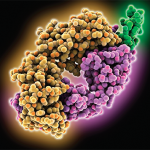 For patients with difficult-to-treat systemic lupus erythematosus (SLE), regular treatment with rituximab may offer a way to maintain disease remission, according to research published in Arthritis & Rheumatology.1 Patients with severe disease localization, in particular, may benefit from rituximab maintenance therapy if traditional therapy, such as glucocorticoids and methotrexate, is ineffective or not well tolerated, or if other licensed biologics are unavailable or not indicated.
For patients with difficult-to-treat systemic lupus erythematosus (SLE), regular treatment with rituximab may offer a way to maintain disease remission, according to research published in Arthritis & Rheumatology.1 Patients with severe disease localization, in particular, may benefit from rituximab maintenance therapy if traditional therapy, such as glucocorticoids and methotrexate, is ineffective or not well tolerated, or if other licensed biologics are unavailable or not indicated.
The study from Cassia et al. examined the efficacy and safety of rituximab in SLE patients, with a particular focus on a subgroup of patients treated with maintenance rituximab to prevent relapse.
“Our study is the first focusing on a cohort of SLE patients treated with rituximab-based maintenance treatment with the aim of relapse prevention,” says Federico Alberici, MD, PhD, associate professor-consultant in Renal Medicine University of Brescia, Brescia, Italy, and the study’s corresponding author and coordinator.
Dr. Alberici emphasized the need to improve remission in SLE patients as a key phase of disease management, as well as the need to find an effective maintenance therapy to achieve this outcome. Traditional drugs, he says, may provide some disease control, but flares remain common. Although biologic therapy, in particular belimumab, is effective at controlling flares in subsets of SLE patients with mucocutaneous and articular involvement, belimumab is not currently indicated for patients with active, severe, disease localization.
In the study, the researchers retrospectively assessed the efficacy and safety of rituximab in 147 SLE patients at four centers. Sixty-seven of the 147 patients were treated with a single course of rituximab, receiving their doses within a single month given two weeks apart or over four consecutive weeks. Eighty patients were treated with rituximab maintenance therapy, receiving at least three single-rituximab courses, with an interval of four to eight months between consecutive treatment courses. Patients were stratified into four groups based on disease severity at baseline: mild, moderate, severe and drug sparing. The drug-sparing group included patients for whom rituximab was being used to reduce exposure to other drugs with an unfavorable balance of potential benefits and toxicity.
To assess disease activity, the investigators used the European Consensus Lupus Activity Measurement (ECLAM) and the physician’s assessment (i.e., 0 = no sign of active SLE, 1 = mild disease activity and 2 = severe disease activity). They also measured changes in the immunosuppressive drugs used by patients in association with rituximab.
Response to the first course of rituximab was assessed after six months. The study defined a complete response as a physician’s assessment score of 0 or 1, a reduction of at least 50% in ECLAM score and at a least 25% decrease from baseline in immune-modulating therapy dosage. A partial response was defined as a physician’s assessment score greater than 0, a 25–50% reduction in ECLAM score and a 0–25% reduction in immune-modulating therapy dosage. Any other response was defined as treatment failure.


